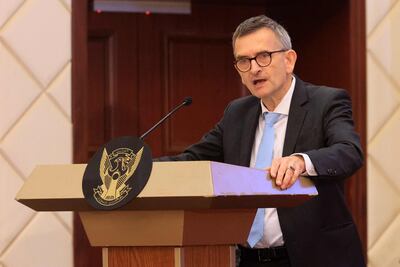The route to a civilian-led government that steers Sudan through a 24-month transitional period before elections faces difficulties so intricate they could unravel the process, analysts say.
The analysts spoke to The National a day after Sudan’s ruling generals and a major pro-democracy coalition signed a preliminary deal to restore the country’s democratic transition 13 months after it was upended by a military coup led by army chief Gen Abdel Fattah Al Burhan.
The agreement includes the departure of the military from politics, the creation of a civilian-led transitional government and a security and defence council in which the military is represented but led by the civilian prime minister.
Thorny issues such as reforming the armed forces and finally implementing a peace deal signed in 2020 with several rebel groups have been left out of the agreement pending further discussions. Also off the table for now are transitional justice and the purging from public life loyalists to the regime of ousted dictator Omar Al Bashir.
“Each one of these issues has the potential of unravelling the deal,” said political analyst Omar Abdel Aziz. “They are time bombs ticking away. They are too tough to resolve.”
Crucially, the successful implementation of Monday’s agreement, particularly a credible civilian-led transitional government, would persuade Sudan’s western and Gulf Arab backers to release billions of dollars in aid to help Sudan pull through its worst economic crisis in living memory.
These funds were suspended after last year’s coup.
Besides its woeful economy, hunger caused mainly by drought and soaring food prices is fast spreading in the vast Afro-Arab nation. Moreover, the security vacuum created by the coup has allowed ethnic and tribal violence in outlying regions to break out, killing hundreds and displacing tens of thousands.
In television interviews after Monday’s signing ceremony, Gen Al Burhan has gone out of his way to emphasise the preliminary nature of the agreement. He described the document as a deal on “national issues” that can only be resolved with the participation of a broader base of political forces.
He has also made it clear that until its departure, the military will have the final say on who is in the transitional government, and will be the sole judge of the success or failure of its policies, suggesting that the generals could veto or intervene in the process.
Gen Al Burhan has also made the military’s departure from politics conditional on the creation of a government of independent technocrats, rather than partisan individuals. The success of the proposed government, he said, will be determined by its ability to fulfil the aspirations of the Sudanese people.
He has also delivered a stern warning to civilian politicians, saying he will not accept meddling in the “technical affairs” of the armed forces.

He said he accepted the agreement’s provision for a civilian to assume the position of supreme commander of the armed forces, as long as he approves and ratifies recommendations presented to him by the military, reducing his role to rubber-stamping decisions of the top brass.
“The worst fears over the fate of the agreement are rooted in Al Burhan’s intentions and the extent of his seriousness in implementing it,” said Khaled Al Fiqy, editor of the online newspaper Al Saqiyah.
“An equally significant challenge is whether the civilian groups can close ranks and for the political parties to accept their exclusion from the next government,” he said.
The deal has already run into opposition from influential groups, including Islamists loyal to Al Bashir, who was ousted in April 2019 after mass street protests against his 29-year rule. The Islamists continue to have sizeable footholds in the judiciary, armed forces and prosecution service.
The Resistance Committees, a neighbourhood-based organisation that has spearheaded the antimilitary protests of the past year, also oppose the agreement. At least 120 protesters have been killed and more than 6,000 injured in those protests.
The Committees, which have recently splintered, embrace an uncompromising position on the military, insisting that the ruling generals must step down unconditionally and be held accountable for the killing of protesters.
Both the Islamists and supporters of the Committees staged street protests against the agreement on Monday, before security forces used teargas and stun grenades to disperse them.
The military forces, despite assertions to the contrary, are also fractured, with growing signs that differences exist between Gen Al Burhan and Gen Mohamed Hamdan Dagalo, his powerful deputy on the ruling, military-led Sovereign Council and commander of the well-armed and combat-seasoned Rapid Support Forces.

Gen Dagalo’s RSF traces its roots to the civil war in the western Darfur region in the 2000s when, as a militia, it fought on the government’s side against ethnic African rebels.
Addressing Monday’s ceremony, Gen Dagalo said the October 25, 2021 coup was a “political mistake” and offered a rare apology for the state’s part in the seemingly endless civil wars waged by the military since independence in 1956 against ethnic or religious groups in the south and west of the country.
“It’s his personal view,” Gen Al Burhan said, when asked to comment on his deputy’s branding of the 2021 coup as a mistake. “It was not a mistake. It was necessary to save us from what could not be seen by all.”






















